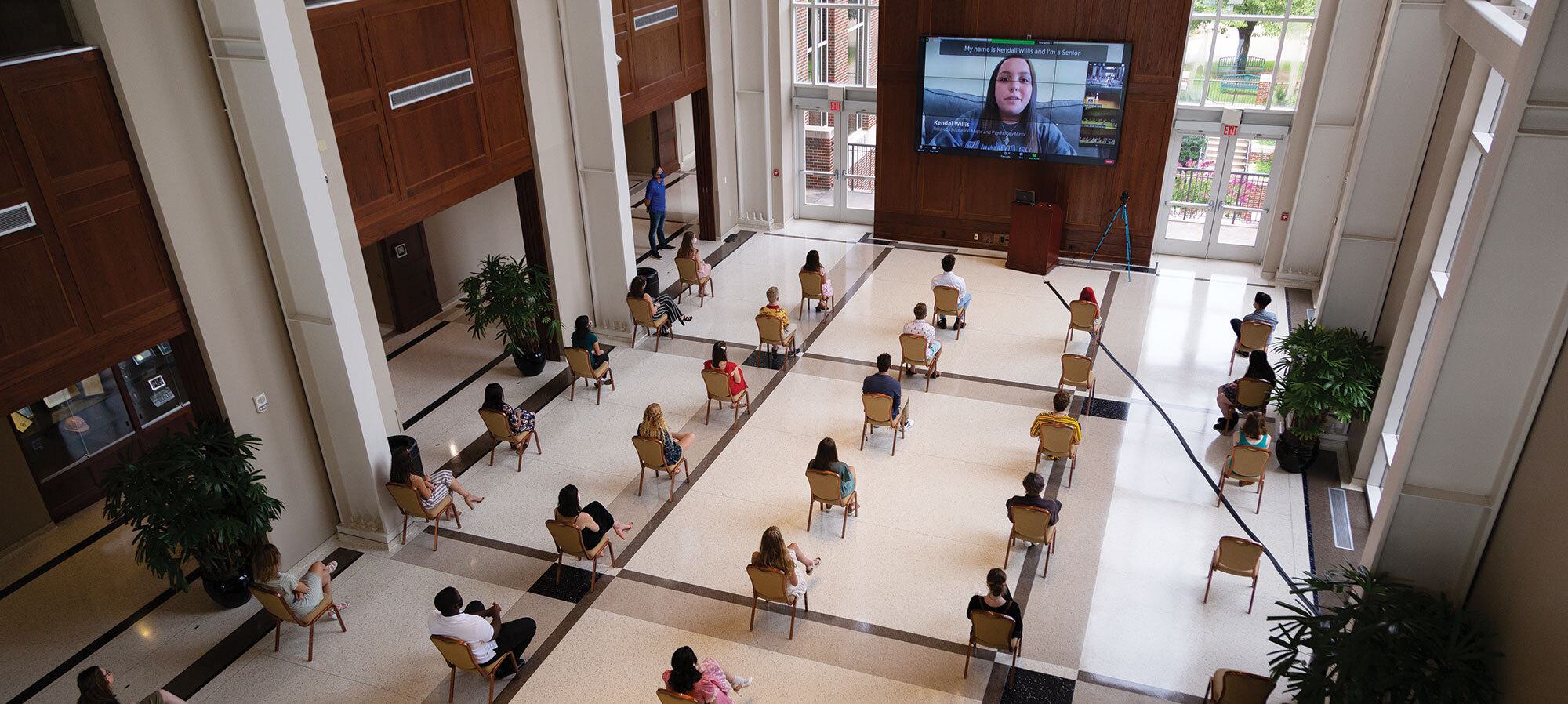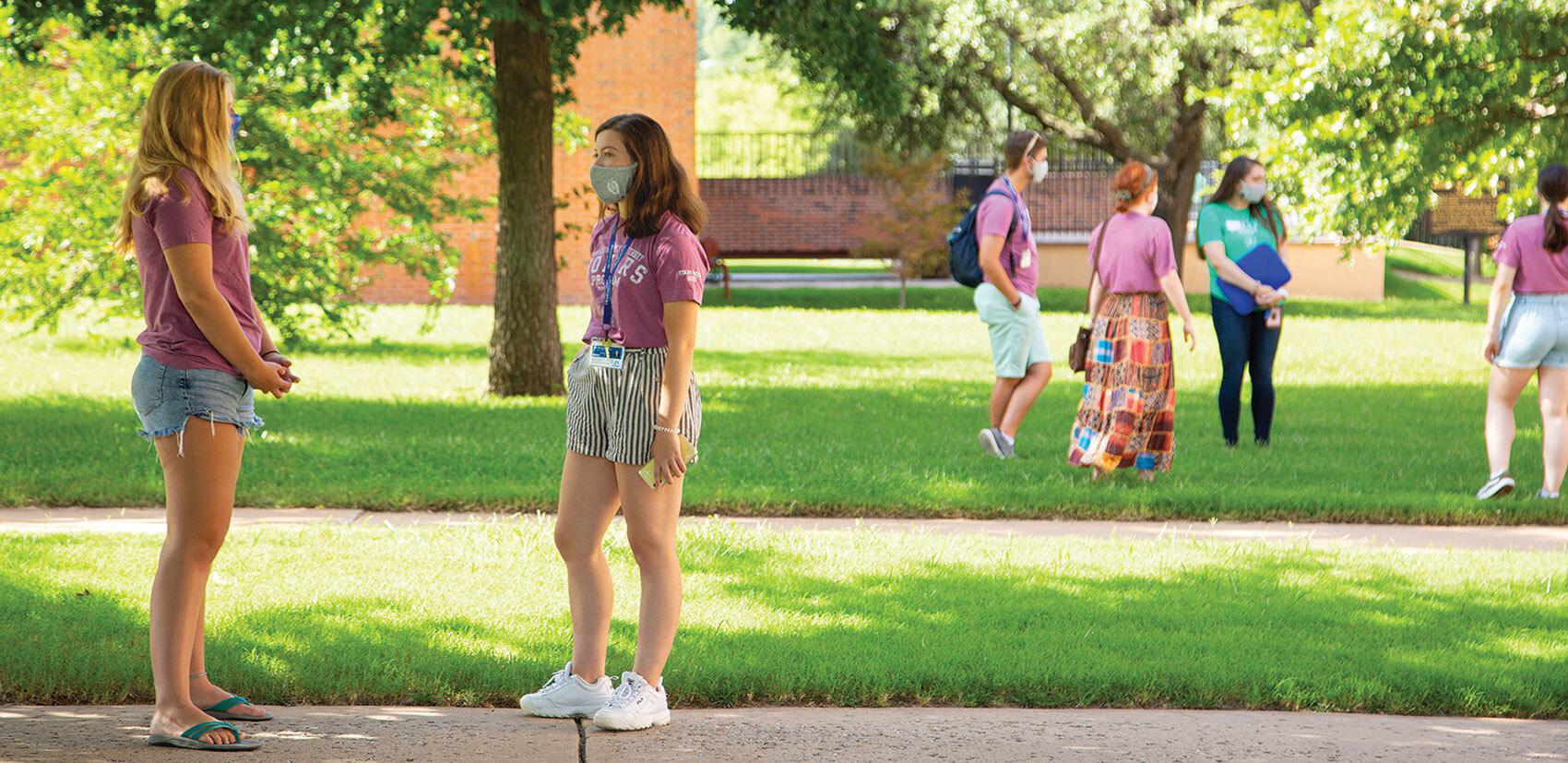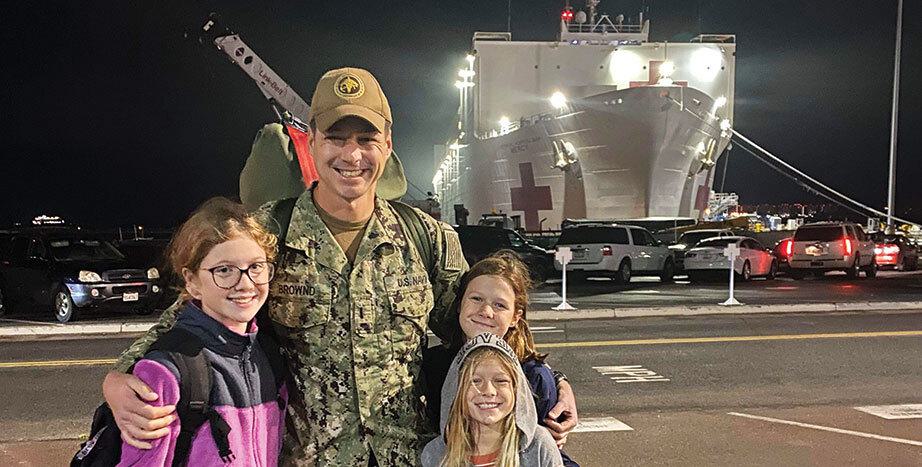by Lindsey Marcus & University Communications

‚ÄĚļž–”÷Ī≤•app has proven our resiliency in the face of challenges time and time again. We will navigate these uncertain times with decisive confidence, remain true to our mission, and emerge from this crisis as the strong, vibrant university we have always been.‚ÄĚ President Martha Burger
Early in the pandemic, ļž–”÷Ī≤•app City University convened its Emergency Operations Center members and worked to prepare for numerous possibilities and keep ļž–”÷Ī≤•app safe. ļž–”÷Ī≤•app had its first confirmed case of COVID-19 on March 6, and on March 11, ļž–”÷Ī≤•app announced ļž–”÷Ī≤•app would move online following spring break for at least two weeks.
A week later, all but essential university employees had transitioned to remote work, and a day after that, it was confirmed‚ÄĒthe rest of the semester would be online.
When staff began returning to campus in June, signs reminded the ļž–”÷Ī≤•app community to wear masks, socially distance, wash hands often, use certain doors as entrances and others as exits, and adhere to lower room capacities. In July, ļž–”÷Ī≤•app implemented a COVID-19 alert level system, deans announced plans for in-person ļž–”÷Ī≤•app, and ļž–”÷Ī≤•app modified the fall 2020 academic calendar to end ļž–”÷Ī≤•app before Thanksgiving. The university similarly modified the spring schedule, starting it a week later in January and skipping spring break.
Campus housing operated dorm move-ins by appointment only, with students cleared after taking a COVID-19 test.
President Martha Burger sent a video message to the ļž–”÷Ī≤•app community early in the semester, congratulating Stars on a safe start to the semester and taking the opportunity to encourage continued safety.
‚ÄúPerhaps the hardest thing of all, do not gather in big groups or crowds, not on campus and not off campus,‚ÄĚ she said. ‚ÄúI know it doesn‚Äôt feel normal, but if we do the hard work now, we will be much more likely to be able to finish fall 2020 together and then come back together again for spring 2021. I‚Äôm proud of our efforts as a community and have every confidence we will continue protecting each other by adhering to the protocols.‚ÄĚ
A Look Back
From the time it was founded in 1904, the university has faced not one, but two global pandemics. In 1918, the then-named ļž–”÷Ī≤•app Methodist University was confronted with an outbreak of the Spanish Flu. Students were given an ‚Äúinfluenza vacation,‚ÄĚ resulting in an extended school year and the removal of all but three school holidays.
Student Life
Once again, a pandemic has changed the way students live and learn on the ļž–”÷Ī≤•app campus.
In the spring, the Student Activities Council held online gatherings such as a meet-and-greet with pets and ‚ÄúZoom Got Talent‚ÄĚ to help students stay connected.
Incoming students were welcomed in the fall with Stars Week, featuring outdoor and virtual activities. Outdoor events included a screening of ‚ÄúKnives Out‚ÄĚ and an open mic night. Virtually, students participated in diversity and inclusion training and a social media challenge. Additionally, ļž–”÷Ī≤•app offered affinity spaces for connection to students of color, students who identify as LGBTQIA+, and those desiring an interfaith community.
Although the school year held many uncertainties, the Student Affairs staff remained optimistic.
‚ÄúStudents adjusted to life back on campus and are adhering to updated campus policies, practices, and procedures fairly well,‚ÄĚ said Dr. Levi Harrel, dean of students. ‚ÄúWe are learning about navigating the unknown together.‚ÄĚ
Student Government Association President Abigail Banks hopes to create an environment of positivity for her fellow Stars.
‚ÄúI truly believe that we can make it through this semester and come out at the end better, stronger, and closer than ever before,‚ÄĚ she said.

Religious Life
Chapel is held on Facebook Live, with singing limited to soloists or ensembles, said the Rev. Elizabeth Horton-Ware, director of Religious Life. Evensong takes place in the Pavilion, weather permitting, and is shared on their Instagram account, @‚ÄČreligiouslifeocu.
Housing and Meals
Residential Life has also been busy with modifications. Beyond mask and social distancing requirements, the team removed triple room spaces from Walker Hall, increased deep cleanings, enacted new visitation policies, provided disinfectant throughout common spaces, and identified isolation housing for students as needed.
Students also noticed changes in the Caf, from expanded hours and a new overflow room to PPE-wearing staff serving food. As a final measure, plexiglass shields and contactless readers were installed at all dining locations.
In the Classroom
Transitioning to virtual learning this past spring and preparing for the fall semester back on campus was a complicated endeavor. Deans have worked closely with Campus Technology Services to equip classrooms with technology for e-learning. Here are some other innovative ways ļž–”÷Ī≤•app has modified the classroom experience in light of COVID-19:
Petree College of Arts and Sciences
No stranger to experiments, Dr. Stephen Prilliman, associate professor and chair of chemistry, has taken new approaches in the classroom. Small groups do guided-inquiry activities over Zoom while in the same room or in their dorms. Lab ļž–”÷Ī≤•app have extra supplies to limit how much students touch the same objects.
Finding inspiration on her back porch this summer, Lynette Atchley, instructor of the class Art by Women of Color, created a makeshift ceramic studio with her children playing nearby while she taught remotely.
Meinders School of Business
Long before anyone knew what ‚ÄúCOVID-19‚ÄĚ meant, said Dean Steven Agee, the business school had executive classrooms equipped for distance learning, an instructional designer for distance learning, and fully online MBA programs.
Using JoinProf.com, created by IT professor Dr. Robert Greve and his business partner, Luke Woodard, students can remotely participate in live class discussions.
Ann Lacy School of American Dance and Entertainment
For the dance school, collaborations are socially distanced or digital. In class, students are restricted to a six-foot taped-off square, said Dean John Bedford. Students alternate between online and in-person ļž–”÷Ī≤•app and received portable dance floors. With new technology, faculty can interact remotely with students, allowing those who might be quarantined to continue ļž–”÷Ī≤•app.
Campus Technology worked with dance school faculty to come up with a solution they call ‚ÄúZoom Carts,‚ÄĚ which are utility carts loaded with a big-screen television, computer, adjustable video camera, and a microphone, all controlled by the instructor. Students can participate in ļž–”÷Ī≤•app remotely in real time via Zoom. The instructor controls the camera angle with a remote and wears a headset with a microphone so students in the room and watching from afar can hear their instruction. The ‚ÄúZoom Carts‚ÄĚ themselves can be positioned in various parts of the classroom.
ļž–”÷Ī≤•app‚Äôs long-running dance companies are on hiatus, but during the pandemic, ļž–”÷Ī≤•app has created a virtual dance company, The Star Dancers, said Jo Rowan, Dance Department chair and American Spirit Dance Company director. The company, including 174 students, will perform in the virtual Star Dancers Christmas Kids Show, which will include 10 pieces of choreography, plus three senior solo shows and an introduction by Santa. It is being recorded with safety rules as a priority, Rowan said.
ļž–”÷Ī≤•app School of Law
The School of Law has also taken many precautions to keep its students safe. Students are seated at least six feet apart in classrooms, with McLaughlin Hall accommodating larger ļž–”÷Ī≤•app. Class times have been adjusted to allow for cleaning between ļž–”÷Ī≤•app and to eliminate large numbers of students arriving and leaving at the same time.
First-year students have all their ļž–”÷Ī≤•app in the same room on the same day, with assigned seats. Some ļž–”÷Ī≤•app are held partly online or entirely online, and all semester exams will be taken before Thanksgiving.
ļž–”÷Ī≤•app School of Theatre and Wanda L. Bass School of Music
The show must go on‚ÄĒand indeed it will‚ÄĒin groundbreaking ways. Fall performances do not have live audiences but are being broadcast to audiences online. Music‚Äôs fall lineup included ‚ÄúMonty Python‚Äôs Spamalot Socially Distant Concert-ish Version‚ÄĚ and a six-person opera, Mozart‚Äôs ‚ÄúCos√¨ fan Tutte.‚ÄĚ Theatre planned similar socially distanced modifications for two mainstage and two StageII shows.
‚ÄúApplause is a beautiful thing, but, as we have all experienced,‚ÄĚ Dean Mark Parker told students, ‚Äúno joy is greater than when we and our peers grow in a cast community.‚ÄĚ
Rehearsals look a lot different, too, with mask coverings for the choir, sanitizing wipes in practice rooms, improved air quality, and resized ļž–”÷Ī≤•app and ensembles. Costume fittings are minimized and involve face masks and shields, along with hand sanitizer. ‚ÄúWe‚Äôre going to grab this opportunity and use the improbable to drive us quicker than ever to the remarkable,‚ÄĚ Parker said.
Kramer School of Nursing
The Kramer School of Nursing has many nursing programs, and Dean Lois Salmeron said each has adapted to deliver the curriculum in the best manner suited to the content and requirements.
Programs that teach in person are the traditional Bachelor of Science in Nursing and the BSN-to-Doctor of Nursing Practice, which require skills training and caring for ‚Äúreal‚ÄĚ people in clinical sites. For other programs, students are able to attend sessions via Zoom, on campus, or a combination of the two. Although some faculty and staff are working remotely, all ļž–”÷Ī≤•app are taught in person on campus by faculty.

Giving Day
None of the work of operating a university in a global pandemic is easy or simple, as the faculty and staff can attest. It requires the dedication and commitment of the campus community and the support of people who love ļž–”÷Ī≤•app City University and its students.
April 30 was ļž–”÷Ī≤•app‚Äôs first #TrueBlueļž–”÷Ī≤•app Giving Day online crowdfunding campaign (read more on the back cover of the magazine). Several in-person events had to be canceled, but the ļž–”÷Ī≤•app community surpassed the $150,000 goal. Donations totaled more than $200,000 to the ļž–”÷Ī≤•app Fund, supporting student scholarships and the university‚Äôs greatest needs.
